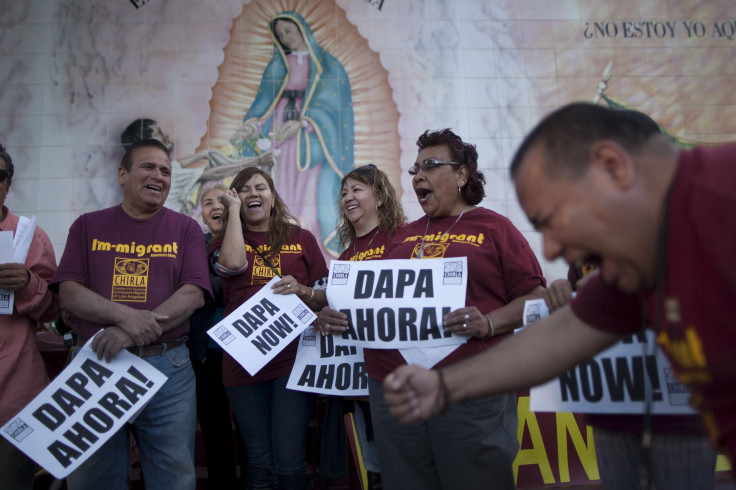
President Barack Obama’s deferred action program faces another round in an ongoing fight over deportation relief that affects around 4 million undocumented immigrants. This round will be fought in the 5th Circuit court in New Orleans, where White House the Department of Justice (DOJ) will square off with attorneys representing a coalition of what could be described as 23 relatively anti-immigrant states. Texas is leading that fight, and filed the initial lawsuit, thus the name of the current case: Texas v U.S.
The prize of this bout is not the final outcome of the case, which will determine if President Obama’s actions legal, but rather what to do while the case is being decided. The deferred action programs, including DACA (for children who grew up in the U.S. ) and DAPA (for their parents), are currently frozen by an injunction. Should the White House be allowed to unfreeze the program, and offer deportation relief to 4 million immigrants?
In one corner, Texas and it’s coalition, as well as dozens of amicus curiae; “friends of the court” that range from Judicial Watch to Presidential candidate Senator Ted Cruz (R-Texas). They want the 5th Circuit to agree with the injunction issued by a lower court. In today’s case, Texas will argue that legal status costs them money. Specifically, they’ll argued that the state will have to shell out money for driver’s licenses and other services. In a friends-of-the-court brief, Judicial Watch quoted sections of that judge’s ruling.
“‘If the preliminary injunction is denied, Plaintiffs will bear the costs of issuing licenses and other benefits once DAPA beneficiaries – armed with Social Security cards and employment authorization documents – seek those benefits.’ [...] Once DAPA beneficiaries received benefits and services from the states, there is no effective way to ‘put the toothpaste back in the tube’” if Texas’ coalition wins it’s argument against the White House.
In the opposite corner, 15 states plus the District of Columbia argue that not giving legal status to the 5 million undocumented immigrants will cost them money. In their brief, they cite previous cases from the 5th Circuit saying that states choose to create services like driver’s licences, and that those costs are “not the result of federal coercion.” The also point out that Texas was the only one out of the 23 states to provide any evidence of increased costs. Then, they hit Texas with this economic hook:
“Moving these people out of the shadows and into the legal workforce is estimated to increase [...] California’s tax revenues are estimated to grow by $904 million over the next five years,” said the brief. “The tax consequences for the Plaintiff States are also positive. For example, if the estimated 594,000 undocumented immigrants eligible for deferred action in Texas receive temporary work permits, it will lead to an estimated $338 million increase in the State tax base over five years.”
Even if Texas can prove that paying for driver’s license are a burden, pro-immigrant states argue, DAPA and DACA should be allowed to move forward elsewhere.
Spectacle Draws Protests, National Attention
If the courthouse is a boxing ring, and the plaintiffs a prizefighter then the dozens of written briefs are just the training, bludgeoning a bag with no opponent. But today there will be a real fight: oral arguments presented in front of the three judges of the 5th Circuit. Immigrants advocates have already taken their ringside seats. Friday morning, hundreds filed in front of the courtroom waving signs and chanting slogans.
“Obama, qué pasó con DACA,” (what happened to DACA) asked one sign. “Immigrant families deserve dignity, not hate,” read another placard, emblazoned with a pair of handcuffs.
While the hearing is happening inside, undocumented families march to defend their victory in NOLA #restorerelief pic.twitter.com/kk3cLdwIzi
— Maria Cabello (@MariFer2013) April 17, 2015Tx lawsuit against #DACA #DAPA ignore the contribution of immigrant women to our comunity #RestoreRelief pic.twitter.com/GsiViYHuUm
— DREAMers' MOMS (@DreamersMOMS) April 17, 2015Didn’t get tickets to the event? Don’t worry, like any old-style sports match, you can listen to today’s oral arguments on the radio (by which we mean the internet). We’ll post a link to that as soon as it’s up.
STAY TUNED: Oral arguments on President Obama’s lawless #amnesty plan are this Friday.https://t.co/BuUwqgWHVa #txlege pic.twitter.com/ThuMnpZaXE
— TX AG's Office (@TXAG) April 14, 2015© 2025 Latin Times. All rights reserved. Do not reproduce without permission.




